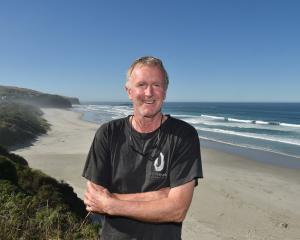Our ill-informed caricatures of terrorists make attacks more likely, terrorism specialist Prof Richard Jackson says. Bruce Munro talks to the University of Otago researcher and ''radical pacifist'', whose first novel gives terrorism a human face.
This two-storey red-brick villa in a leafy street on the edge of the University of Otago's Dunedin campus is about as far removed from terrorism as one could imagine.
Beyond the bay window of the downstairs front room that is Prof Richard Jackson's spacious office, students carrying laptops and textbooks chatter as they wander past.
It is also a world away from the 2003 scenes of war-torn Iraq that followed little more than a year after two hijacked passenger jets slammed into New York's twin towers.
Prof Jackson, who is now deputy director of the university's National Centre for Peace and Conflict Studies, was in the United Kingdom when the military might of the United States and its allies rolled into Baghdad.
The renowned terrorism specialist recalls seeing a large photo on the front page of a British newspaper not long after the invasion began.
''It was so affecting. As soon as I saw it, I thought, 'If that man becomes a terrorist I wouldn't blame him','' Prof Jackson says.
''He was just standing there holding his little daughter who looked to be about 2 or 3, and she was dead.
''He was crying out to the heavens. You could see the agony in his face.
''And I thought, 'If someone invaded my country and killed someone I loved and I fought back, I don't think anyone would blame me for that'.''
In Prof Jackson's about-to-be-released first novel Confessions of a Terrorist, the description of that photo is recounted by Prof Youseff Said, an Egyptian academic turned terrorist.
''When I saw that, I really felt his pain so deeply,'' the professor says.
''And I felt rage, real incandescent rage. It started to flow up in me like, like ...
like a volcano!''Well, it was then that I knew I had to do something!''The fictional professor is seated in a small concrete cell. On the other side of a bare table, another man, a British intelligence officer, is seated facing him.
Their conversation, recorded as a redacted, censored, memo-strewn transcript, is the substance of the novel.
In it, seeing the photo leads the professor to take up arms.
It did not have the same effect on Prof Jackson, despite his own harrowing brushes with armed conflict and institutionalised oppression as he was growing up.
Why the difference? It is an important question.
Prof Jackson has studied war and political violence for more than 20 years, as a student at Canterbury University, later as professor of international politics at Aberystwyth University, Wales, and now at Otago.
He has researched the methods and motivations of terrorists throughout the world, and interviewed convicted former terrorists including Patrick Magee, of Northern Ireland, whose attempt to kill Margaret Thatcher saw him dubbed the Brighton Bomber.
When it comes to terrorism, most of what we think is wrong, Prof Jackson claims.
There is a ''missing dimension'' to the understanding normally garnered from the media and politicians' statements.
''We think they [terrorists] do it for no reason at all; that they do it just because they are evil.''
That is not the typical picture, if we care to look closely enough, he says.
''They are doing it, in many cases, because of the bad things we are doing overseas.
''We don't want to be confronted with our own actions.
"But if we want to break that cycle - of Western countries invading, bombing, sanctioning, and then terrorists trying to attack us, and then us using that as an excuse to bomb and invade other countries - then we have to confront 'Why really do they hate us? Why really are they fighting us?'.''
The professor of the novel puts it to the intelligence officer like this: ''And I admit it, the pain turned into a burning rage ... a cold rage at all the senseless violence, the meddling, the arrogance ... the indifference to the suffering caused.
''I started to realise that I do not need your permission to resist.
"If you are somehow allowed to kill whoever you choose ... women, children ... Africans ... Arabs ... well, I am allowed to resist you. It is my right, no, my duty to resist you ...''
Because of the disconnect, however, Western efforts to tackle terrorism are doomed, Prof Jackson says.
Take, for example, the official lists of terrorist groups. Globally, the United Nations has designated more than 400 groups and individuals as terrorists.
New Zealand has adopted that list, making it a criminal offence to support or deal with those groups or their activities.
This country has also designated a further 19 groups as terrorists under the Terrorism Suppression Act 2002.
The most recent additions, Boko Haram and Ansaru, both based in Nigeria, were announced by Prime Minister John Key this month.
''These designations ... form part of our Government's support against terrorism activities,'' Mr Key said.
The lists are ''not helpful'', Prof Jackson says.
They prevent the very thing that could help, dialogue and negotiation.
''Groups that might be prepared to surrender or give up their [violent] struggle for political struggle are now in a no-win situation,'' he says.
''They are on the list. They are going to be killed, they are going to be captured and tortured. No-one is allowed to talk to them. The only thing they can do is fight to the death.
''Now to me, that's just stupidity.''
He is disappointed New Zealand is not taking a more proactive role in promoting peace, instead ''siding with one of the great powers and joining in their view of security''.
Norway, by contrast, has been actively trying to negotiate peace between groups such as the Palestinians and the Israelis, and the Tamils and the Sri Lankan Government.
Efforts at deradicalisation - propaganda campaigns to encourage those with extreme and violent perspectives to adopt more moderate views - are also misguided, Prof Jackson says.
''The whole thing is a misnomer and a mess. Because it doesn't understand that radical views are not the determinant of [violent] behaviour.
''In fact, there are thousands, probably millions, of people who are radical but prefer to sit around and talk about it. They will never do anything, but their views are very radical.''
What causes the willingness to use violence is a growing area of study. Prof Jackson's work in the area and that of his United States-based friend, psychologist Dr John Horgan, have thrown up some fascinating insights.
''Their views don't change, but the means by which they want to pursue their goals change,'' Prof Jackson says.
Terrorist groups often start out as part of a broader, non-violent movement arguing for change, he says.
''But when they get seriously repressed and those aspirations are blocked in a draconian way, they come to think they have only one option, which is to fight.
''It's usually only a small minority who come to think ... 'We have to hit them back like they hit us'.''
Prof Jackson himself admits to being radicalised, twice.
The second time was as a young man hitchhiking in South Africa, in 1984, when apartheid tensions were mounting.
He got on a bus and the white driver told an old, tired-looking black lady to get off her seat and move to the back of the bus so the strong, healthy, 17-year-old could have a seat.
''I felt so ashamed,'' Prof Jackson says, the dismay and horror still evident in his voice 30 years later.
''Because of the colour of my skin I got a privilege and she got a bit humiliated and was forced to stand on the bus.''
It was an affecting experience, coming on top of the daily poverty, discrimination and humiliation he saw elsewhere during his journey.
He became an anti-apartheid campaigner and a fervent member of the anti-apartheid movement.
But he was never tempted to resort to violence. It is a choice he puts down to an innate inclination towards pacifism radicalised by a terrifying brush with military violence when he was 15.
Prof Jackson was born and raised in Zambia, in south central Africa. His parents were missionaries, living in a rural area near the southern border with Rhodesia (now Zimbabwe).
Military incursions by Rhodesian forces chasing independence fighters being aided by Zambian soldiers were not uncommon.
Once, at school, the pupils and teachers had to hide under their desks because of a gunfight a few hundred metres away.
The family was sometimes visited by soldiers who presumed because they were white they supported Rhodesia's racist regime.
They also heard of people who did not have the right identity cards being taken off buses and shot.
Then, one day, it was his turn.
''I got grabbed and I was being taken away because they thought I was 16 when I was only 15.
''My father was pleading with them not to take me away. It was very, very tense.
''I don't know what happened but in the end they let me back on the bus.
''I felt the sheer terror of being at the mercy of a person with a gun in a war situation, who probably thought he had the right to do whatever.''
He now describes himself as a radical pacifist.
''My pacifism came from my personal conviction and my experience of thinking I was going to be shot. And also just seeing what violence did, understanding that violence is something you never recover from, even implicit violence. The thought that someone could shoot you, it shakes your view of the safety and stability of the world, all your certainties disappear in that moment.
''And so, realising that war is just such a horrible thing ...
to me it would be better to peacefully resist and be killed than to actually kill someone else or to participate in the collective killing of other people.''
He would use force to protect family or friends in immediate danger of serious injury, but only after trying to use non-violent alternatives first.
''I would also be willing to suffer harm myself to try and protect them, but I wouldn't be willing to kill another person or commit extreme violence against them.
''I prefer to work for a world without violence so that I never have to face such a dilemma.''
Both the professor and the intelligence officer of Prof Jackson's novel are men who have killed in the name of their causes.
But the evidence points to a better way, he says.
Research is showing non-violent resistance can overthrow totalitarian governments, change politics and achieve new freedoms for people. In fact, one study has shown that during the past century, non-violent methods have been twice as successful as violence in achieving those goals.
The Dunedin-based centre is becoming one of the leading lights in this research, Prof Jackson says.
''We don't know the exact circumstances in which that is all worked out yet, but it is an amazing revelation.
"We all think a guerrilla movement and violent resistance is a successful way of achieving goals.
"But it turns out Gandhi was right; you are much more likely to achieve your goals eventually and with a lot less destruction and death if you can mobilise people with non-violent resistance.''
It is a strong ray of hope, but not one Prof Jackson believes most Western governments will be drawn to any time soon.
It is extremely difficult to get the governments of the United States, the United Kingdom, and probably New Zealand, to change their point of view, he believes.
''It's a mindset that is very entrenched and fixated ... which sees the world in very stark terms of good guys and bad guys.
''But they don't understand that the way they behave as a consequence of that world-view actually creates the very thing they are afraid of, because it makes people angry, it creates terrorism and resistance.''
Change, if it is to come, will probably have to be from below, he says.
''Citizens have to embrace each other and not accept the suspicious cynicism which is at the root of that world-view.''
This is why he has written his first novel; a provocative, deep exploration of terrorism that deliberately plays with readers' assumptions and packs a mind-bending plot twist.
He hopes students of peace and conflict studies will find it an interesting way of learning, and that it will engage and inspire a wider audience as well.
''I could have written another academic book making these points, but not many people would have read it.
''I think it is one of the only ways change will occur; for the people who elect politicians to put pressure on them.''
Time is up, but Prof Jackson has a parting shot.
''We think we can sometimes use evil means to achieve peaceful ends,'' he says.
''But every time we try to tame violence and use it for good ends, it just doesn't work.
''Violence can't be tamed, it is a cycle that has to be broken.''
Get it
Confessions of a Terrorist, by Richard Jackson, published by Zed Books, will be released on May 8.












